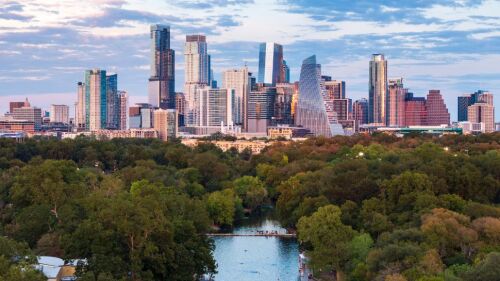Austin is much different today than in 1997, but one thing is the same: its mayor.
Mayor Kirk Watson has served in state and local government in some capacity since the early 1990s. Notably, his mayoral terms have flanked 25 years. Watson first assumed his role as city chief near the turn of the century and returned in 2023 for his third term. He was reelected to his fourth term in 2024 due to a change in local law.
Your ATXtoday City Editors visited City Hall to chat with Watson about his career in local government and how his first term as mayor compares to today.
First, here are some quick facts about our mayor:
- Watson received his Doctor of Law from Baylor University — the same school where he earned his Bachelor of Arts — in 1981.
- He was elected to his first term as 54th mayor of Austin in 1997 and was reelected in 2001 (the same year Leslie Cochran ran for mayor) with 84% of the vote.
- He stepped down in November 2001 to run for Texas attorney general, a bid he lost to Greg Abbott.
- Watson served 13+ years in the Texas Senate from 2007 to 2020.
- He’s a cancer survivor — Watson battled the disease in his early 30s.
What made you want to run for mayor in 1997 and again in 2022?
“It was much the same thing, although clearly different times. (My wife) Liz and I moved here in 1981, and we didn’t know anybody in this town. We’d never really been to Austin. Her high school class had come down for a senior trip, and she was a year ahead of me in school. [...] We fell in love with Austin almost immediately, and within a couple of months, we said, ‘Let’s see if we can stay here.’ [...] It was really the love of the town and the belief that I could contribute in a way and my desire to kind of keep the city on a track that I thought was the best track for Austin. That’s the same thing that happened in 2022 — I still love this town greatly.”
Can you compare your experience as mayor in 1997 to now?
“One big difference is that when I was elected mayor the first time, Austin was becoming a big international city. We created the very first resource center for the homeless. We created the first affordable housing trust fund, the first SMART Housing program, which is an affordable housing program. I created The Mayor’s Challenge Fund so that we could preserve affordable housing. [...] My point being that back then, some of the issues that have gone to scale today, we were beginning to experience. Today, we’re a big international city, and as a result of that, a lot of our challenges have gone to scale.
“We are a city today that enjoys immense success — we’re the envy of the world.”
The good news is that both then and now, most of our big challenges were the result of success. We are a city today that enjoys immense success — we’re the envy of the world. I mean, we’re a focal point in a worldwide economy, so we’re not managing decay. What we’re doing is managing our success so that we make sure we have transportation needs, we make sure that we’re not ill-affordable, we make sure that we’re a complete city, so that anybody and everybody will have the ability to afford to be here.”
How do you feel about Austin’s continued growth?
“Growth was a key political driver all through the ‘90s, as it is even today. Growth is a sign of success, right? The biggest challenge that I think growth is creating now is affordability. It’s as simple as supply and demand. You don’t have enough housing to meet the needs of all of the people that have come here, that have stayed here, that are born here. Affordability is, in my view, the highest priority that is being impacted by our growth.”
What’s something that stayed constant between your first term and current term?
“Well, apparently, the mayor.
One is the spirit of Austinites, including new Austinites, folks that probably barely get to call themselves Austinites [...] and how much they deeply care about this city and engage with it. That is part of the fabric of this town, and [...] it doesn’t take somebody very long to really become advocates for their city.
“People love this place and they want it to be special.”
Austin has embraced this idea that it’s okay to be open. It’s okay to embrace new thinking and new ideas. I tease that the number one bumper sticker and T-shirt is ‘Keep Austin Weird.’ What that’s always meant to me is ‘Keep Austin Open’ to new thinking. [...] We’ve got lots of people that have made a lot of money off weird ideas. You still have this openness, this willingness to embrace change.
I think a big part of that is that we have a fountain of youth, and that fountain of youth includes the University of Texas at Austin, of course, but it also includes Texas State, it includes Huston-Tillotson, it includes Concordia, St. Ed’s, ACC. Every year, we have a whole bunch of new young people show up with new thinking, new ideas, new music, new culture, more diversity, you name it. [...] People love this place and they want it to be special.”
What would you be doing if you weren’t working in government or in law?
“I don’t really know because this is what I have dedicated myself to. There’s no way that I can just sit around — I’m constitutionally incapable of that, and I would drive myself crazy, not to mention everybody around me. So, the truth of the matter is, I’m doing what I want to be doing, or I wouldn’t be doing it.”
Can you compare your time in the Texas Senate to your time as mayor?
“One of the big differences is the immediate impact of what you do. I’m really proud of my career in the Senate and we did a lot of good things, but most of the time as a senator, you’re passing a piece of legislation, or stopping one, and then you have to wait to see how the agencies are going to deal with it, or how it gets implemented as a law. Here, you’re this close to the people, so you can just reach out and touch, and your decision-making has an almost immediate impact. That’s one of the things I like very much about the position.”












